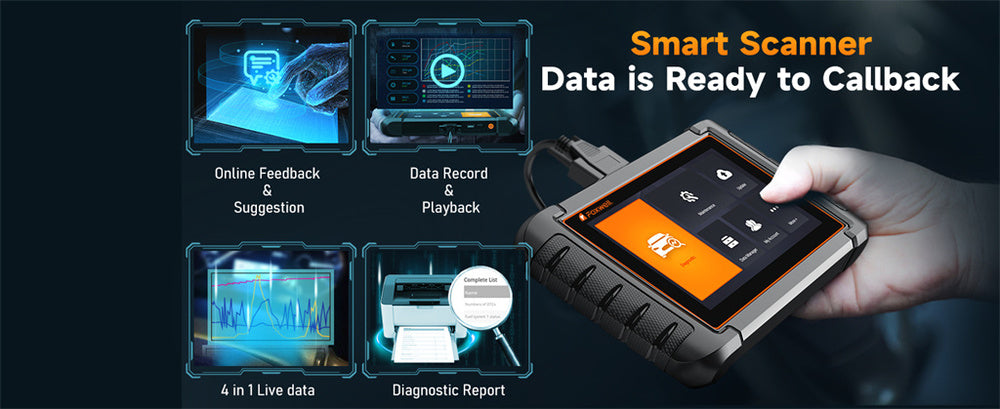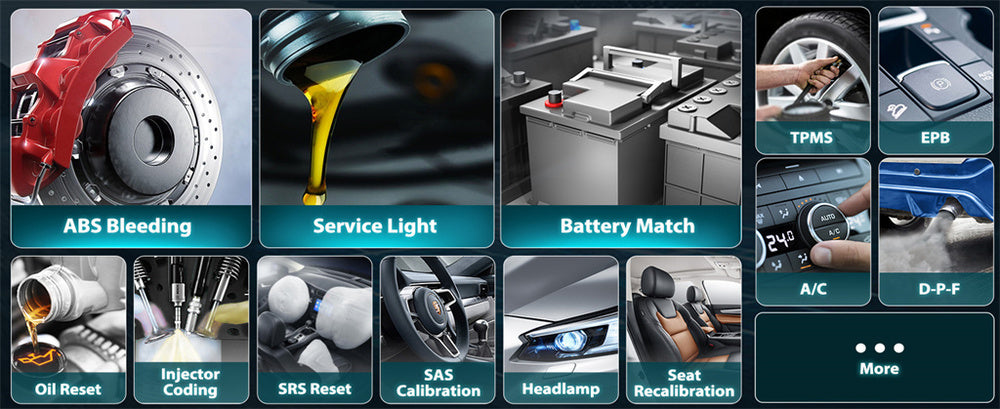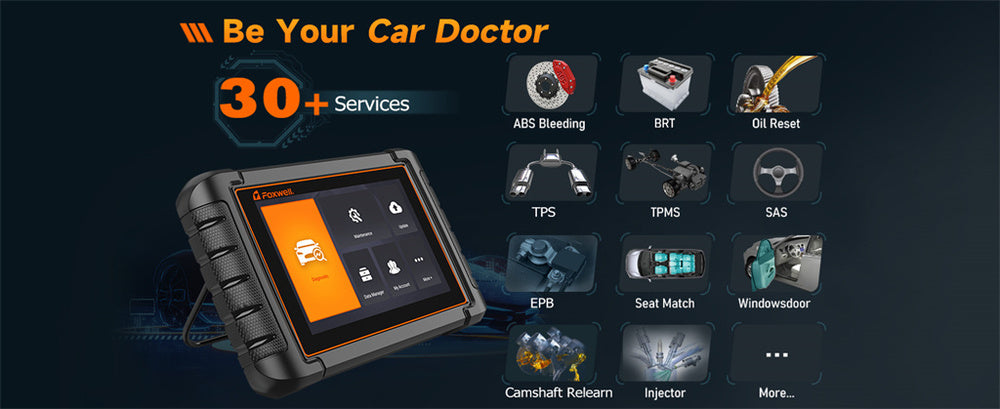We focus on making an important decision for any car owner or enthusiast: selecting an engine scan tool suitable to your car's needs.
With so many available solutions on the market, finding the appropriate tool may seem like a daunting task - let us make this easier by breaking it down into manageable steps for selecting just what will meet all of your criteria!
Foxwell, a trusted name in automotive diagnostics car scanner, offers products designed to suit different budgets. Their entry-level NT809 can provide essential vehicle diagnosis, while their advanced GT60 provides more in-depth solutions.
Understanding Your Needs

The first step to selecting an engine scan tool that meets your unique requirements is assessing what you require. Here is how you can get a clear idea of your requirements:
Frequency of Use
- Occasional Use: If your plans only require occasional diagnostic scan tool use, an affordable and straightforward model could suffice.
- Frequent Use: As a car enthusiast or professional mechanic, frequent use requires tools with durable components that can withstand constant use.
Diagnostic Requirements
- Simple Diagnostics: For simple tasks like reading and clearing codes, resetting the check engine light, and basic troubleshooting, an entry-level tool may suffice.
- Advanced Diagnostics: For complex issues regarding ABS, SRS, transmission, or other systems, look for tools with more extensive diagnostic capabilities.
- Beginner-Friendly Tools: For those just beginning their car diagnostics journey, find tools with clear instructions and an intuitive user interface to help make their search for car solutions simpler.
- Technically Savvy: If you are knowledgeable in both technology and car mechanics, then selecting a tool with advanced features and customizable settings could be more suitable, even if its learning curve is steeper.
Budget:
Numerous affordable tools provide essential features for casual users on a tight budget. While they may be less robust, these products should suffice to meet basic needs.
- Higher Budget: Opting for a high-end model can give you access to advanced diagnostics, improved build quality, and additional features that could save both time and money over time.
Investigate Compatibility
Compatibility should always be at the forefront of mind when selecting an engine scan tool. Here is how you can ensure you choose one compatible with your vehicle:
- OBD-II Systems for Universal Compatibility: Most vehicles manufactured after 1996 feature OBD-II systems that standardized diagnostic trouble codes and data. When choosing your tool for this system, make sure it supports OBD-II protocols.
- Vehicle Make and Model-Specific Scan Tools: Certain scan tools have been designed specifically for specific car brands, offering more in-depth diagnostics and functionalities tailored to that manufacturer's vehicles.
- Universal Tools: Many universal tools are designed to work with various makes and models of vehicles, so be sure to read product specifications to ensure compatibility with your specific vehicle. With regard to diesel vs gasoline engines, consider which will best meet your needs:
- Engine Type: Before selecting a scan tool for your vehicle's engine type, ensure it supports it. Some tools specialize solely in gasoline engines, while others can manage both gasoline and diesel engines.
Connector Types
- Standard OBD-II Connector: Most modern scan tools utilize a standardized OBD-II connector. Verify that it matches up with your vehicle's diagnostic port to ensure optimal results.
Recurring Software Updates
- Regular Software Updates: Choose a tool from a manufacturer that provides ongoing software updates to stay up-to-date with the newest vehicle models and diagnostic codes. This ensures compatibility.
Regional Compatibility
- Geographical Differences: When purchasing tools in different regions, be mindful of any variances in vehicle specifications or diagnostic protocols used there. Please make sure they are compatible with cars sold locally.
Evaluating Price vs Value
Although it may be tempting to go with the least expensive option, ensuring you are receiving value for your money is critical. Here are some ways you can effectively evaluate price and value:
Make a List of Must-Have Features
- Essential Features: Make a list of must-have features based on your needs and research tools within your budget that offer as many features as you require.
- Additional Features: Consider whether additional features are worth their additional costs, such as real-time data streaming and advanced diagnostics, which may prove beneficial but come at a premium.
Build Quality
- Durability: Higher-priced tools tend to feature better build quality, which leads to longer-lasting and more reliable performance.
- Warranty and Support: Look out for manufacturers offering warranties or customer support packages; these can add immense value and peace of mind.
- Long-Term Savings Preventive Maintenance: An expensive but feature-packed tool can help identify issues early, potentially saving money in repairs in the long run.
- Professional Use: Investing in high-quality tools can increase the efficiency and quality of service delivery if you work as a mechanic or often service multiple vehicles.
User Experience
- Ease of Use: Consider how user-friendly a tool is; sometimes, investing more in an intuitive tool can save both time and frustration.
- Software and Updates: Tools offering frequent software updates may provide more excellent value over time by keeping up with emerging diagnostic techniques and vehicle models.
Reading Reviews and Seeking Recommendations
Before making any purchases, it is crucial to gather as much information from reliable sources as possible. Here is how reviews and recommendations can be used effectively:
Examine Online Reviews
Reviews From Multiple Platforms mes For an accurate understanding of a tool's performance, look for reviews across several platforms such as Amazon, automotive forums, and review sites such as Car and Driver and Consumer Reports. Doing this gives a more holistic picture.
Common Themes: Keep an eye out for any recurring praise or complaints by multiple users; any repeated issues raised could be an indicator that something needs to change.
Expert Opinions
- Professional Reviews: Consult reviews written by automotive experts and industry professionals for in-depth comparisons that may prove very helpful.
- Video Reviews: Watching video reviews may give a clearer idea of the tool's interface and usability, helping make an informed decision.
Peers' Recommendations for Success
- Consult Professional Mechanics or Car Enthusiasts: Consult professionals or enthusiasts with extensive knowledge in using various scan tools; their insights could prove invaluable.
- Participate in Online Communities: Take an active role in online forums and social media groups dedicated to car maintenance. Here, individuals often share personal experiences and provide trustworthy advice for reliable tools.
Test Before You Buy
- Demo Units: Take a test drive of demo units at automotive stores in order to assess their ease of use and features. Doing this can give you an accurate idea of whether this tool meets your needs or not.
- Return Policies: Take time to carefully read through a retailer's return policy before making your selection. A generous return policy enables you to test out a tool and return it if it fails to meet expectations.

Conclusion
Selecting an engine scan tool requires understanding your individual needs, researching compatibility issues, weighing price against value considerations, reviewing customer reviews, and seeking recommendations from trusted brands like Foxwell. By following these steps and considering trusted tools such as these from Foxwell, you can confidently choose one to keep your car running efficiently and smoothly.
Thank you for tuning into Car Care Insights. If this guide was helpful to you, subscribe and leave us a review - until then, drive safely and take good care of your vehicle!
FAQs:
What factors should I consider when choosing an engine scan tool?
Consider compatibility with your car, user-friendliness, real-time data features, connectivity options, and availability of regular software updates.
Are all engine scan tools compatible with every car?
No, it’s essential to check the scan tool’s compatibility with your specific car make and model to ensure accurate diagnostics.
Why are regular software updates important for engine scan tools?
Regular updates keep the scan tool current with the latest vehicle models and diagnostic protocols, ensuring precise and effective performance.




Leave a comment
This site is protected by hCaptcha and the hCaptcha Privacy Policy and Terms of Service apply.